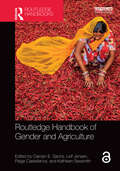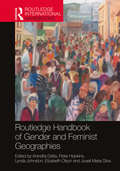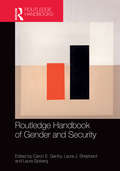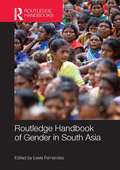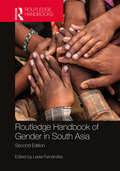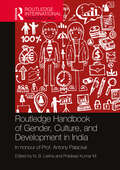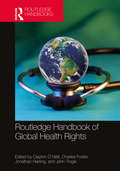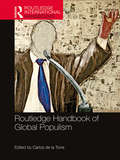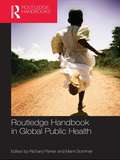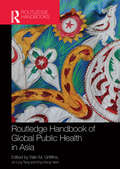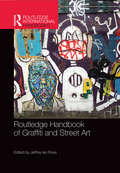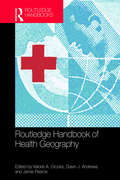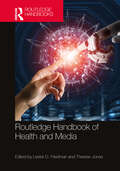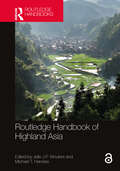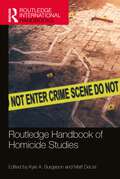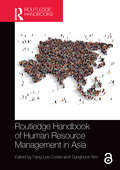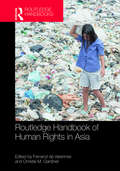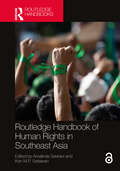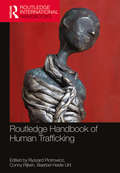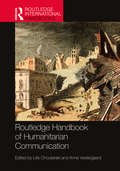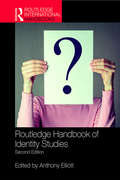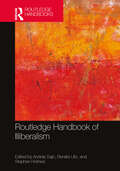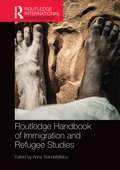- Table View
- List View
Routledge Handbook of Gender and Agriculture
by Carolyn E. Sachs, Leif Jensen, Paige Castellanos, and Kathleen SexsmithThe Routledge Handbook of Gender and Agriculture covers major theoretical issues as well as critical empirical shifts in gender and agriculture. Gender relations in agriculture are shifting in most regions of the world with changes in the structure of agriculture, the organization of production, international restructuring of value chains, climate change, the global pandemic, and national and multinational policy changes. This book provides a cutting-edge assessment of the field of gender and agriculture, with contributions from both leading scholars and up-and-coming academics as well as policymakers and practitioners. The handbook is organized into four parts: part 1, institutions, markets, and policies; part 2, land, labor, and agrarian transformations; part 3, knowledge, methods, and access to information; and part 4, farming people and identities. The last chapter is an epilogue from many of the contributors focusing on gender, agriculture, and shifting food systems during the coronavirus pandemic. The chapters address both historical subjects as well as ground-breaking work on gender and agriculture, which will help to chart the future of the field. The handbook has an international focus with contributions examining issues at both the global and local levels with contributors from across the world. With contributions from leading academics, policymakers, and practitioners, and with a global outlook, the Routledge Handbook of Gender and Agriculture is an essential reference volume for scholars, students, and practitioners interested in gender and agriculture.
Routledge Handbook of Gender and Feminist Geographies (Routledge International Handbooks)
by Elizabeth Peter Johnston Datta Anindita Hopkins Lynda Olson Joseli Maria SilvaThis handbook provides a comprehensive analysis of contemporary gender and feminist geographies in an international and multi-disciplinary context. It features 48 new contributions from both experienced and emerging scholars, artists and activists who critically review and appraise current spatial politics. Each chapter advances the future development of feminist geography and gender studies, as well as empirical evidence of changing relationships between gender, power, place and space. Following an introduction by the Editors, the handbook presents original work organized into four parts which engage with relevant issues including violence, resistance, agency and desire: Establishing feminist geographies Placing feminist geographies Engaging feminist geographies Doing feminist geographies The Routledge Handbook of Gender and Feminist Geographies will be an essential reference work for scholars interested in feminist geography, gender studies and geographical thought.
Routledge Handbook of Gender and Security
by Laura Sjoberg Laura J. Shepherd Caron E. GentryThis handbook provides a comprehensive look at the study of gender and security in global politics. The volume is based on the core argument that gender is conceptually necessary to thinking about central questions of security; analytically important for thinking about cause and effect in security; and politically important for considering possibilities of making the world better in the future. Contributions to the volume look at various aspects of studying gender and security through diverse lenses that engage diverse feminisms, with diverse policy concerns, and working with diverse theoretical contributions from scholars of security more broadly. It is grouped into four thematic sections: Gendered approaches to security (including theoretical, conceptual, and methodological approaches); Gendered insecurities in global politics (including the ways insecurity in global politics is distributed and read on the basis of gender); Gendered practices of security (including how policy practice and theory work together, or do not); Gendered security institutions (across a wide variety of spaces and places in global politics). This handbook will be of great interest to students of gender studies, security studies and IR in general.
Routledge Handbook of Gender and Water Governance (Routledge Environment and Sustainability Handbooks)
by Margreet Zwarteveen Tatiana Acevedo-Guerrero Lisa Bossenbroek Irene Leonardelli Seema KulkarniThis handbook provides a comprehensive overview of the field of gender and water governance, exploring how the use, management and knowledge of water resources, services and the water environment are deeply gendered.In water there is a recognized gender gap between water responsibilities and water rights and bridging this gap is likely to help achieve not just goals of equity but also those of sustainability. Building on a rich legacy of feminist water scholarship, the Routledge Handbook of Gender and Water Governance is a collection of reflections and studies that can be used as a prismatic lens into a thriving and ever proliferating array of feminist water studies. It provides a clear testimony of how hydrofeminism has evolved from rather instrumental gender and water studies to scholarship that uses feminist tools to pry open, critically reflect on and formulate alternatives to water development-as-usual. The book also shows how the community of feminists interested in studying water has diversified and expanded, from often white female scholars studying projects and gender relations in the so-called Global South, to a varied mix of scholars and activists theorizing from diverse geographical and political locations – prominently including the body. It is organized into five interconnected parts: Part I: Positionality and embodied waters Part II: Revisiting water debates: diplomacy, security, justice and heritage Part III: Sanitation stories Part IV: Precarious livelihoods Part V: New feminist futures Each of these parts brings out the gendered nature of water, shedding light on the often neglected care and unpaid labour of women and its relationship with extractivism and socioeconomic inequalities. The overall aim of the handbook is to apply social science insights to water governance challenges, creating synergies and linkages between different disciplines and scientific domains.The Routledge Handbook of Gender and Water Governance is essential reading for students, scholars and professionals interested in water governance, water security, health and sanitation, gender studies and sustainable development more broadly.
Routledge Handbook of Gender in South Asia
by Leela FernandesProviding a comprehensive overview of the study of gender in South Asia, this Handbook covers the central contributions that have defined this area and captures innovative and emerging paradigms that are shaping the future of the field. It offers a wide range of disciplinary and interdisciplinary perspectives spanning both the humanities and social sciences, focussing on India, Pakistan, Bangladesh and Sri Lanka. The Handbook brings together key experts in the field of South Asia and gender, women and sexuality. Chapters are organised thematically in five major sections: Historical formations of gender and the significance of colonialism and nationalism Law, Citizenship and the Nation Representations of Culture, Place, Identity Labour and the Economy Inequality, Activism and the State This timely survey is essential reading for scholars who research and teach on South Asia as well as for scholars in related interdisciplinary fields that focus on women and gender from comparative and transnational perspectives.
Routledge Handbook of Gender in South Asia
by Leela FernandesThis new edition of the Routledge Handbook of Gender in South Asia provides a comprehensive overview of the study of gender in South Asia. The Handbook covers the central contributions that have defi ned this area and captures innovative and emerging paradigms that are shaping the future of the field. It offers a wide range of disciplinary and interdisciplinary perspectives spanning both the humanities and social sciences, focusing on India, Pakistan, Bangladesh and Sri Lanka. This revised edition has been thoroughly updated and includes new chapters, thus adding new areas of scholarship. The Handbook is organized thematically into five major parts: • Historical formations and theoretical framings • Law, citizenship and the nation • Representations of culture, place, identity • Labor and the economy • Inequality, activism and the state The Handbook illustrates the ways in which scholarship on gender has contributed to a rethink of theoretical concepts and empirical understandings of contemporary South Asia. Finally, it focuses on new areas of inquiry that have been opened up through a focus on gender and the intersections between gender and categories, such as caste, ethnicity, sexuality, and religion. This timely study is essential reading for scholars who research and teach on South Asia as well as for scholars in related interdisciplinary fields that focus on women and gender from comparative and transnational perspectives.
Routledge Handbook of Gender, Culture, and Development in India (Routledge International Handbooks)
by N. B. Lekha Kumar M. PradeepLekha, Kumar M., and their team of contributors embark on a transformative exploration of 'Intersectionality' in the Indian context, where gender, culture, and development intersect to shape the destinies of diverse groups. Drawing from extensive research and nuanced analyses by scholars across the country and a few scholars on India from outside the country, the handbook uncovers the intricate connections between gender inequalities, cultural norms and practices, and developmental trajectories that illuminate how these factors intersect and shape the lives of individuals, communities, and societies beyond India's borders.The book encompasses discussions on the category of gender and the practice of gender studies, workspace economy, and technology. It explains the intricate intersections between gender, labour, migration, and informal economies, offering a deeper understanding of the composite factors that shape women as the workforce and their role within the workplace and the economy. It also delves into the multifaceted influences of culture on various aspects of society, including gender roles, language, agriculture, and development. The focus upon the sociocultural dimensions connected to the portrayal of gender in the media elaborated on how diverse media platforms, ranging from digital interfaces to televised serials, play a pivotal role in shaping and mirroring gender identities, roles, and societal norms within their specific environments. Most importantly, it critically engages with issues of education, marginalization, inclusion, and sustainable development. Case studies on marginalized communities such as the urban poor, elderly sweepers, and widows contribute to broader discourses on developmental paradigms vis-à-vis poverty and social exclusion.Academics, researchers, and students interested in gender, culture, and development studies will find this handbook invaluable in understanding and addressing gender inequities, cultural imbalances, and development complexities. Policymakers, NGOs, and activists committed to social progress will appreciate the evidence-based insights enabling them for informed actions and policies that transcend conventional boundaries.
Routledge Handbook of Global Health Rights
by Clayton Ó Néill, Charles Foster, Jonathan Herring, and John TingleThis book examines the idea of a fundamental entitlement to health and healthcare from a human rights perspective. The volume is based on a particular conceptual reasoning that balances critical thinking and pragmatism in the context of a universal right to health. Thus, the primary focus of the book is the relationship or contrast between rights-based discourse/jurisprudential arguments and real-life healthcare contexts. The work sets out the constraints that are imposed on a universal right to health by practical realities such as economic hardship in countries, lack of appropriate governance, and lack of support for the implementation of this right through appropriate resource allocation. It queries the degree to which the existence of this legally enshrined right and its application in instruments such as the International Covenant on Economic, Social and Cultural Rights (ICESCR) and the Universal Declaration of Human Rights (UDHR) can be more than an ephemeral aspiration but can, actually, sustain, promote, and instil good practice. It further asks if social reality and the inequalities that present themselves therein impede the implementation of laudable human rights, particularly within marginalised communities and cadres of people. It deliberates on what states and global bodies do, or could do, in practical terms to ensure that such rights are moved beyond the aspirational and become attainable and implementable. Divided into three parts, the first analyses the notion of a universal inalienable right to health(care) from jurisprudential, anthropological, legal, and ethical perspectives. The second part considers the translation of international human rights norms into specific jurisdictional healthcare contexts. With a global perspective it includes countries with very different legal, economic, and social contexts. Finally, the third part summarises the lessons learnt and provides a pathway for future action. The book will be an invaluable resource for students, academics, and policymakers working in the areas of health law and policy, and international human rights law.
Routledge Handbook of Global Populism (Routledge International Handbooks)
by Carlos de la TorreThis volume illustrates the diversity of populism globally. When seeking power, populists politicize issues, and point to problems that need to be addressed such as inequalities, the loss of national sovereignty to globalization, or the rule of unresponsive political elites. Yet their solutions tend to be problematic, simplistic, and in most instances, instead of leading to better forms of democracy, their outcomes are authoritarian. Populists use a playbook of concentrating power in the hands of the president, using the legal system instrumentally to punish critics, and attacking the media and civil society. Despite promising to empower the people, populists lead to processes of democratic erosion and even transform malfunctioning democracies into hybrid regimes. The Routledge Handbook of Global Populism provides instructors, students, and researchers with a thorough and systematic overview of the history and development of populism and analyzes the main debates. It is divided into sections on the theories of populism, on political and social theory and populism, on how populists politicize inequalities and differences, on the media and populism, on its ambiguous relationships with democratization and authoritarianism, and on the distinct regional manifestations of populism. Leading international academics from history, political science, media studies, and sociology map innovative ideas and areas of theoretical and empirical research to understand the phenomenon of global populism.
Routledge Handbook of Global Public Health
by Richard Parker Marni SommerAt the beginning of the twenty-first century, key public health issues and challenges have taken centre stage. They range from arsenic in drinking water to asthma among children and adults; from the re-emergence of cholera, to increasing cancer rates and other chronic diseases; from AIDS to malaria and hepatitis; from the crises faced by displaced or refugee populations to the new challenges that have emerged for reproductive health and rights. Like most aspects of contemporary life, these problems have been impacted by globalization. The issues that confront us are being shaped by evolving processes such as the growth of inequalities between the rich and the poor in countries around the world, the globalization of trade and commerce, new patterns of travel and migration, as well as a reduction in resources for the development and sustainability of public health infrastructures. The Routledge Handbook of Global Public Health explores this context and addresses both the emerging issues and conceptualizations of the notion of global health, along with expanding upon and highlighting the critical priorities in this rapidly evolving field. It is organized in ten main sections. The topics covered include: The transition from international to global health Structural inequalities and global public health Ecological transformation and environmental health in the global system Population and reproductive health Conflict, violence and emergencies in global public health Global public health policy and practice Global public health and development Global mental health Global access to essential medicines Health systems, health capacity, and the politics of global public health This comprehensive handbook will provide an authoritative overview for students, practitioners, researchers, and policy makers working in or concerned with public health around the globe.
Routledge Handbook of Global Public Health in Asia
by Siân M. Griffiths Jin Ling Tang Eng Kiong YeohGlobal public health is of growing concern to most governments and populations, nowhere more so than in Asia, the world’s largest and most populous continent. Whilst major advances have been made in controlling infectious diseases through public health measures as well as clinical medical treatments, the world now faces other challenges including ageing populations and the epidemic crisis of obesity and non-communicable diseases. New emerging infections continue to develop and the growing threats to health due to environmental pollution and climate change increase the need for resilience and sustainability. These threats to health are global in nature, and this Handbook will explore perspectives on current public health issues in South, Southeast and East Asia, informing global as well as regional debate. Whilst many books cite Western examples of the development of global public health, this Handbook brings together both Western and Eastern scholarship, creating a new global public health perspective suitable to face modern challenges in promoting the population’s health. This Handbook is essential reading not only for students, professionals and scholars of global public health and related fields but is also written to be accessible to those with a general interest in the health of Asia.
Routledge Handbook of Graffiti and Street Art (Routledge International Handbooks)
by Jeffrey Ian RossThe Routledge Handbook of Graffiti and Street Art integrates and reviews current scholarship in the field of graffiti and street art. Thirty-seven original contributions are organized around four sections: History, Types, and Writers/Artists of Graffiti and Street Art; Theoretical Explanations of Graffiti and Street Art/Causes of Graffiti and Street Art; Regional/Municipal Variations/Differences of Graffiti and Street Art; and, Effects of Graffiti and Street Art. Chapters are written by experts from different countries throughout the world and their expertise spans the fields of American Studies, Art Theory, Criminology, Criminal justice, Ethnography, Photography, Political Science, Psychology, Sociology, and Visual Communication. The Handbook will be of interest to researchers, instructors, advanced students, libraries, and art gallery and museum curators. This book is also accessible to practitioners and policy makers in the fields of criminal justice, law enforcement, art history, museum studies, tourism studies, and urban studies as well as members of the news media. The Handbook includes 70 images, a glossary, a chronology, and the electronic edition will be widely hyperlinked.
Routledge Handbook of Health Geography
by Jamie Pearce Gavin J. Andrews Valorie A. CrooksThe places of our daily life affect our health, well-being, and receipt of health care in complex ways. The connection between health and place has been acknowledged for centuries, and the contemporary discipline of health geography sets as its core mission to uncover and explicate all facets of this connection. The Routledge Handbook of Health Geography features 52 chapters from leading international thinkers that collectively characterize the breadth and depth of current thinking on the health–place connection. It will be of interest to students seeking an introduction to health geography as well as multidisciplinary health scholars looking to explore the intersection between health and place. This book provides a coherent synthesis of scholarship in health geography as well as multidisciplinary insights into cutting-edge research. It explores the key concepts central to appreciating the ways in which place influences our health, from the micro-space of the body to the macro-scale of entire world regions, in order to articulate historical and contemporary aspects of this influence.
Routledge Handbook of Health and Media
by Lester D. Friedman Therese JonesThe Routledge Handbook of Health and Media provides an extensive review and exploration of the myriad ways that health and media function as a symbiotic partnership that profoundly influences contemporary societies. A unique and significant volume in an expanding pedagogical field, this diverse collection of international, original, and interdisciplinary essays goes beyond issues of representation to engage in scholarly conversations about the web of networks that inextricably bind media and health to each other. Divided into sections on film, television, animation, photography, comics, advertising, social media, and print journalism, each chapter begins with a concrete text or texts, using it to raise more general and more theoretical issues about the medium in question. As such, this Handbook defines, expands, and illuminates the role that the humanities and arts play in the education and practice of healthcare professionals and in our understanding of health, illness, and disability. The Routledge Handbook of Health and Media is an invaluable reference for academics, students and health professionals engaged with cultural issues in media and medicine, popular representations of disease and disability, and the patient/professional health care encounter.
Routledge Handbook of Highland Asia
by Jelle J.P. Wouters and Michael T. HeneiseThe Routledge Handbook of Highland Asia is the first comprehensive and critical overview of the ethnographic and anthropological work in Highland Asia over the past half a century. Opening up a grand new space for critical engagement, the handbook presents Highland Asia as a world-region that cuts across the traditional divides inherited from colonial and Cold War area divisions - the Indian Subcontinent/South Asia, Southeast Asia, China/East Asia, and Central Asia. Thirty-two chapters assess the history of research, identify ethnographic trends, and evaluate a range of analytical themes that developed in particular settings of Highland Asia. They cover varied landscapes and communities, from Kyrgyzstan to India, from Bhutan to Vietnam and bring local voices and narratives relating trade and tribute, ritual and resistance, pilgrimage and prophecy, modernity and marginalization, capital and cosmos to the fore. The handbook shows that for millennia, Highland Asians have connected far-flung regions through movements of peoples, goods and ideas, and at all times have been the enactors, repositories, and mediators of world-historical processes. Taken together, the contributors and chapters subvert dominant lowland narratives by privileging primarily highland vantages that reveal Highland Asia as an ecumune and prism that refracts and generates global history, social theory, and human imagination. In the currently unfolding Asian Century, this compels us to reorient and re-envision Highland Asia, in ethnography, in theory, and in the connections between this world-region, made of hills, highlands and mountains, and a planetary context. The handbook reveals both regional commonalities and diversities, generalities and specificities, and a broad orientation to key themes in the region. An indispensable reference work, this handbook fills a significant gap in the literature and will be of interest to academics, researchers and students interested in Highland Asia, Zomia Studies, Anthropology, Comparative Politics, Conceptual History and Sociology, Southeast Asian Studies, Central Asian Studies and South Asian Studies as well as Asian Studies in general.
Routledge Handbook of Homicide Studies (Routledge International Handbooks)
by Matt DeLisi Kyle A. BurgasonThe Routledge Handbook of Homicide Studies comprehensively examines the topic of homicide from a diverse collection of perspectives and backgrounds. It brings together original contributions on homicide, with a focus on the broad range of impacts of homicide from a multitude of disciplines that evaluate and examine homicide in actual practice and theory. The editors have assembled a comprehensive collection highlighting the multifaceted causes and ramifications of homicide both across the United States and globally, with chapters exploring the current state of homicide, typologies of homicides offenders, causes and correlates of homicide, homicides and the criminal justice system, and a professional observations chapters authored by some of the leading practicing professionals in the world, many of whom have made pivotal contributions to the evaluation and investigation of homicide offenders and cases. Providing state-of-the-art scholarship on homicide in modern society, this handbook is a key collection and an invaluable resource for students, researchers, and practitioners engaged in the study of homicide across a diverse range of disciplines, including criminal justice and criminology, psychology, sociology, forensics, interdisciplinary departments, and sociolegal studies.
Routledge Handbook of Homicide Studies (Routledge International Handbooks)
by Matt DeLisi Kyle A. BurgasonThe Routledge Handbook of Homicide Studies comprehensively examines the topic of homicide from a diverse collection of perspectives and backgrounds. It brings together original contributions on homicide, with a focus on the broad range of impacts of homicide from a multitude of disciplines that evaluate and examine homicide in actual practice and theory. The editors have assembled a comprehensive collection highlighting the multifaceted causes and ramifications of homicide both across the United States and globally, with chapters exploring the current state of homicide, typologies of homicides offenders, causes and correlates of homicide, homicides and the criminal justice system, and a professional observations chapters authored by some of the leading practicing professionals in the world, many of whom have made pivotal contributions to the evaluation and investigation of homicide offenders and cases. Providing state-of-the-art scholarship on homicide in modern society, this handbook is a key collection and an invaluable resource for students, researchers, and practitioners engaged in the study of homicide across a diverse range of disciplines, including criminal justice and criminology, psychology, sociology, forensics, interdisciplinary departments, and sociolegal studies.
Routledge Handbook of Human Resource Management in Asia
by Fang Lee Cooke and Sunghoon KimHuman Resource Management (HRM) is fundamentally shaped by institutional and cultural factors, such as the different political environments and social philosophies of particular countries and regions. By examining the various organizational aspects of business life and systems of people management in Asia, the study of HRM across the continent can, therefore, give us a greater understanding of Asian societies, as well as the contemporary world of work more generally. This handbook provides an up-to-date and intellectually engaging overview of HRM in the Asian context. Distinctive in its comprehensive coverage of traditional as well as emerging topics of HRM, it analyzes important themes, such as the regulatory framework for work and employment, religiosity, family business, and gender. Using a comparative approach, it also effectively highlights the unique features of each country’s attitudes towards HRM. Covering a range of themes and case studies, sections include: • Institutional and cultural contexts, • Labour regulation and industrial relations, • Thematic and functional HRM, • HRM in selected Asian countries, such as China, Japan, Vietnam, India, and Singapore. Written in a highly accessible style, this book will be useful to students and scholars of Human Resource Management, Asian Business, Economics, and Sociology. Chapter 15 of this book is freely available as a downloadable Open Access PDF at http://www.taylorfrancis.com under a Creative Commons Attribution-Non Commercial-No Derivatives (CC-BY-NC-ND) 4.0 license.
Routledge Handbook of Human Rights in Asia
by Fernand De Varennes Christie M. GardinerThe Routledge Handbook of Human Rights in Asia provides a rich study of human rights challenges facing some of the most vulnerable people in Asia. While formal accession to core international human rights instruments is commonplace across the region, the realisation of human rights for many remains elusive as development pressure, violent conflict, limited political will and discrimination maintain human rights volatility. This Handbook explores the underlying causes of human rights abuse in a range of contexts, considers lessons learnt from global, regional and domestic initiatives and provides recommendations and justifications for reform. Comprising 23 chapters, it examines the strengths and weaknesses of human rights institutions in Asia and covers issues such as: Participation, marginalisation, detention and exclusion Private sector responsibility and security Conflict and post-conflict rehabilitation Trafficking, displacement and citizenship Ageing populations, identity and sexuality. Drawing together a remarkable collection of leading and emerging scholars, advisers and practitioners, this Handbook is essential reading for students, scholars, policy makers and advocates of human rights in Asia and the world.
Routledge Handbook of Human Rights in Southeast Asia
by Amalinda Savirani and Ken M.P. SetiawanThe Routledge Handbook of Human Rights in Southeast Asia analyses some of the region’s most pressing human rights issues, while also giving attention to those actors and institutions that work towards improvement.Chapters by international experts in the field provide readers with a background on some of Southeast Asia’s most pressing human rights concerns. The book builds on, and contributes to, existing analyses of human rights in Southeast Asia to further enhance our understanding of what sits behind the region’s ambivalent human rights track record. Following an introduction, the handbook is structured in eight parts. The chapters cover a wide range of human rights issues including human rights debates at political and regional levels, and how human rights are experienced every day, such as the rights to food, water, and work: Advancing Human Rights through ASEAN Refugees: Protecting Rights and Strengthening Agency Transitional Justice in Southeast Asia: Confronting the Past Balancing Moral Perspectives: Ideologies and Human Rights Intersections between Workers’ Rights, Corporations and the State Accessing and Maintaining Rights to Water, Food, and Health On the Frontline: Human Rights Defenders Promoting Human Rights in Southeast Asia: New Directions and Strategies The handbook considers the political and social contexts in which human rights emerge, the dynamics of their contestation and violation, and how rights are claimed. It demonstrates that human rights are a practice and goes beyond considering human rights as formal structures in laws, regulations, and meeting rooms. A timely overview and analysis of the situation of Human Rights in Southeast Asia, this handbook will be a valuable reference work for scholars and practitioners in human rights, the field of Asian Law, Asian Studies in general and Southeast Asian Studies in particular.Chapter 2 of this book is freely available as a downloadable Open Access PDF at http://www .taylorfrancis .com under a Creative Commons Attribution-NonCommercial-No Derivatives (CC-BY-NC-ND) 4.0 license.
Routledge Handbook of Human Trafficking (Routledge International Handbooks)
by Ryszard Piotrowicz Conny Rijken Baerbel Heide UhlTrafficking in human beings (THB) has been described as modern slavery. It is a serious criminal activity that has significant ramifications for the human rights of the victims. It poses major challenges to the state, society and individual victims. THB is not a static given but a constantly changing concept depending on societal changes and opinions, economic situations and legal developments. THB occurs both transnationally and within countries. The complexity of THB is such that it requires a wide range of expertise fully to address the phenomenon. Edited by a team of leading international academics, the Routledge Handbook of Human Trafficking will provide an interdisciplinary introduction to THB. It is aimed at academics, students, research universities and non-governmental organisations, as well as policy makers. It will review THB through the lens of law, anthropology, social and political science and will address statistical, data protection issues and showcase the most effective research methods, analyse the various actors and stakeholders and the different types of exploitation of trafficked persons. It will critically highlight and analyse the most pressing current challenges posed by THB.
Routledge Handbook of Humanitarian Communication (Routledge International Handbooks)
by Lilie Chouliaraki Anne VestergaardThe Routledge Handbook of Humanitarian Communication is an authoritative and comprehensive guide to research in the academic sub-field of humanitarian communication. It is broadly focused on communication that presents human vulnerability as a cause for public concern and encompasses communication with respect to humanitarian aid and development as well as human rights and "humanitarian" wars.Recent years have seen the expansion of critical scholarship on humanitarian communication across a range of academic fields, sharing recognition of the centrality of media and communications to our understanding of humanitarianism as an agent of transnational power, global governance and cosmopolitan solidarity. The Handbook brings into dialogue these diverse fields, their theoretical frameworks and methodological approaches as well as the public debates that lie at the heart of the contemporary politics of humanitarianism. It consolidates existing knowledge and maps out this emerging field as an important site of interdisciplinary knowledge production on media, communication and humanitarianism.As such, the Handbook is not simply a collection of texts sharing a similar theme. It is a coherent intellectual contribution which systematizes current critical scholarship in terms of Domains, Methods and Issues and sets an agenda of emerging and evolving research priorities in the field. Consisting of 26 chapters written by international scholars, who have contributed to laying the foundation of the field, this volume provides an essential guide to the key ideas, issues, concepts and debates of humanitarian communication.
Routledge Handbook of Identity Studies: 2nd edition (Routledge International Handbooks)
by Anthony ElliottIn this comprehensive, accessible handbook, acclaimed social theorist Anthony Elliott brings together internationally distinguished and emergent scholars in the social sciences and humanities to review the major theoretical traditions, trends and trajectories in the hugely popular field of identity studies. The Routledge Handbook of Identity Studies set new standards for reference works when first published, such was the far-reaching sweep of topics discussed – including identity studies reconfigured by feminism, post-structuralism and postmodernism, individualization theories, media and cultural studies, race and ethnicity, consumerism, environmentalism, post-colonialism, globalization and many more. This second edition of the handbook contains new contributions, including an updated general introduction from Anthony Elliott on the fast-changing conditions and contours of identity transformations in the global age. There are also new chapters on the emergence of posthuman identities - with specific focus on the global consequences of biotechnology, biomedicine, robotics and artificial intelligence for the analysis of identity - and on identity mobilities. The handbook's clear and accessible format will appeal to a wide undergraduate audience, as well as researchers and teachers, in the social sciences and humanities.
Routledge Handbook of Illiberalism
by András SajóThe Routledge Handbook of IIliberalism is the first authoritative reference work dedicated to illiberalism as a complex social, political, cultural, legal, and mental phenomenon. Although illiberalism is most often discussed in political and constitutional terms, its study cannot be limited to such narrow frames. This Handbook comprises sixty individual chapters authored by an internationally recognized group of experts who present perspectives and viewpoints from a wide range of academic disciplines. Chapters are devoted to different facets of illiberalism, including the history of the idea and its competitors, its implications for the economy, society, government and the international order, and its contemporary iterations in representative countries and regions. The Routledge Handbook of IIliberalism will form an important component of any library's holding; it will be of benefit as an academic reference, as well as being an indispensable resource for practitioners, among them journalists, policy makers and analysts, who wish to gain an informed understanding of this complex phenomenon.
Routledge Handbook of Immigration and Refugee Studies (Routledge International Handbooks)
by Anna TriandafyllidouThe Routledge Handbook of Immigration and Refugee Studies offers a comprehensive and unique study of the multi-disciplinary field of international migration and asylum studies. Utilising contemporary information and analysis, this innovative Handbook provides an in depth examination of legal migration management in the labour market and its affect upon families in relation to wider issues of migrant integration and citizenship. With a comprehensive collection of essays written by leading contributors from a broad range of disciplines including sociology of migration, human geography, legal studies, political sciences and economics, the Handbook is a truly multi-disciplinary book approaching the critical questions of: Migration and the labour market Integration and citizenship Migration, families and welfare Irregular migration smuggling and trafficking in human beings asylum and forced migration. Organised into short thematic and geographical chapters the Routledge Handbook of Immigration and Refugee Studies provides a concise overview on the different topics and world regions, as well as useful guidance for both the starting and the more experienced reader. The Handbook’s expansive content and illustrative style will appeal to both students and professionals studying in the field of migration and international organisations.
